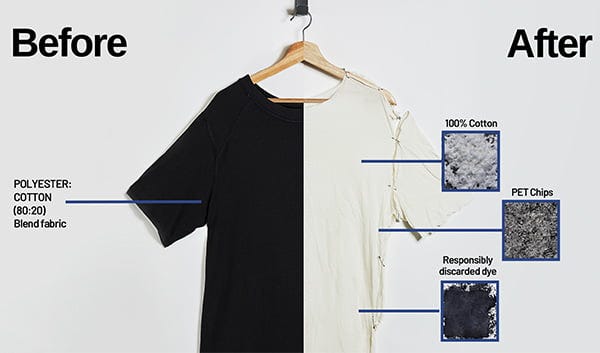Circ: The new fiber revolutionizing the fashion industry

In a world grappling with the environmental impact of the fashion industry, a Danville, Virginia-based company called Circ is making waves with its groundbreaking new fiber technology. Circ has developed a revolutionary process that transforms textile waste into a high-quality, versatile fiber that can be used to create a wide range of apparel and products.
Circ's innovative process is rooted in the principles of circularity, aiming to eliminate waste and keep resources in use for as long as possible. The technology breaks down discarded clothing and other textile waste into its basic molecular components, effectively "recycling" the material at its core. These molecules are then reassembled into a new fiber, known as Circ fiber, which possesses exceptional properties and can be tailored for specific applications. Their innovation lies in a proprietary process that transforms discarded textiles, primarily cotton and polyester blends, back into their original fibers, ready to be spun into new yarns and fabrics. “Circ's technology represents a significant breakthrough in textile recycling. Their ability to transform discarded textiles into high-quality fibers is a game-changer for the fashion industry," says Professor Rachel McQueen, Textile Science, University of Alberta.
This process, unlike traditional recycling methods that often result in downgraded materials, maintains the quality and integrity of the original fibers. Circ's technology relies on a combination of hydrothermal and chemical treatments that gently break down the fabric blends into their constituent cellulose and polyester components. These purified fibers are then collected and processed into high-quality recycled pulp, suitable for textile production.
Properties and applications
Circ fiber's unique properties make it an attractive alternative to conventional fibers like cotton and polyester. It is inherently sustainable, reducing the need for virgin materials and minimizing the industry's environmental footprint. Additionally, the fiber is soft, durable, and moisture-wicking, offering both comfort and performance. It can be seamlessly blended with other fibers, enabling versatility in design and application.
Commercial success
Circ's innovative technology has garnered significant attention from major fashion brands committed to sustainability. Patagonia, H&M, Levi's, and Zara, among others, have partnered with Circ to incorporate their recycled fibers into their product lines. This collaboration underscores the growing demand for sustainable textiles and Circ's potential to transform the industry. Beyond apparel, Circ fiber also finds applications in home textiles, automotive interiors, and even medical products.
- Patagonia, renowned for its environmental activism, has embraced Circ fibers as a key component of its circular economy strategy. Their latest T-shirt collection features Circ's recycled cotton fibers, showcasing the technology's ability to create high-quality apparel with a minimal environmental impact.
- H&M, recognizes Circ's potential to reduce its environmental footprint and enhance its sustainability credentials. They have incorporated Circ's recycled polyester fibers into its Conscious Collection, demonstrating its commitment to sustainable fashion. "Circ's circular approach to textile production aligns perfectly with our sustainability goals. Their recycled fibers enable us to create durable and eco-conscious products that resonate with our customers," opines Helena Helmersson, CEO, H&M Group.
- Levi's, the iconic denim brand, is exploring Circ fibers to create more sustainable and durable jeans.
- Zara, a trendsetting fashion retailer, sees Circ as a means to offer stylish and eco-conscious clothing to its vast customer base.
With its groundbreaking Circ, is poised to revolutionize the fashion industry. Their commitment to circularity, coupled with their ability to create high-quality recycled fibers, has garnered support from major brands and industry experts. As the demand for sustainable textiles continues to grow, Circ's technology is set to play a pivotal role in shaping a more responsible and eco-conscious fashion future.
